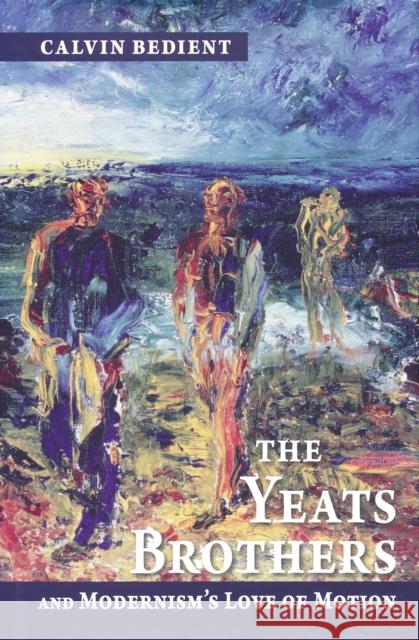Yeats Brothers and Modernism's Love of Motion » książka
Yeats Brothers and Modernism's Love of Motion
ISBN-13: 9780268022068 / Angielski / Twarda / 2008 / 420 str.
In "The Yeats Brothers"," "Calvin Bedient delivers a brilliant exploration of modernism through the mutual illumination provided by Ireland s greatest poet and greatest painter. By examining the poems of the one and the paintings of the other, he recovers an often overlooked quality both artists embraced in their work that core feature of modernism, a thoroughgoing preoccupation with motion and fluidity, that terrifying encounter with the universe conceptualized as force.Bedient s is the first book to treat W. B. Yeats and Jack Yeats as twin geniuses in the detection and representation of chaos. William Butler Yeats s love and fear of motion pervade every aspect of his poetry, helping to determine his themes, riddle his images, and shape the cadences of his verse. Jack Yeats s focus on change and motion caused him to engage with the cross-currents of his time, not as sometimes thought to remain locked in the past.Through daring and nuanced readings of the poems and analyses of the paintings, Bedient reveals the two artists to have been complicit with modernism against homogeneity, alert to divisions, polyphony, and restlessness in things and in ourselves. Adept in close discussion of poetic and painterly style, and magisterial in his grasp of theorists from Adorno through Zizek, Bedient provides us with genuinely new interpretations of the Yeats brothers work, and with a more sophisticated understanding of modernism. There are dozens of books on W. B. Yeats, and some on his brother Jack, but no one has put the two together before. Calvin Bedient does so very adroitly, without conflating their respective achievements. Bedient argues brilliantly that these two very different artists reveal a meaningful shortcoming in our customary understanding of modernism; by showing that both were fascinated by movement, or mobility the diverse processes of change Bedient pulls the poet toward the painter to show these two artists in sympathy with the thought of their time. An important revisionary argument about the meaning of modernism, Bedient s work also exhibits a lively, candid critic explaining the work of the Yeats brothers in readings that constantly repay attention. No one could have a better companion while reading W. B. Yeats poems, or viewing Jack Yeats paintings. Robert von Hallberg, University of Chicago Welcome to the terrible novelty of light. Fearless, virtuosic, turbulence-charged, "The Yeats Brothers and Modernism's Love of Motion" is a ravishing triumph. Plunging with nonetheless meticulous yet rippling (and yes, muscled) analytic brilliance and sensuousness through the poems and paintings of W.B. and Jack Yeats, Bedient gives us one of the most profound, emulatively thrilling, stylish, and wide-awake celebrations of poetry, of painting, and of Modernism itself, one could hope to read. No one has better caught or rather transmitted so much of the towering "and" torrential genius of the Yeats brothers, seen here in a rushing storm of cultural, political, aesthetic, and daemonic forces. The unstaunched motive, and emotive, force of Bedient's book takes us directly into the tragic yet joyful indeed exultant leap of poem after poem, canvas after canvas, all of them luminous, endlessly reconstitutive and volatile elements of what remains, in these gorgeous pages, the bursting dawn of their Movement, still redolent as it is with the storm-scattered intricacy of night. Peter Sacks, Harvard University This is a captivating and theoretically sophisticated study of what Calvin Bedient identifies as mobility in the Modernist poems and paintings of the two Yeats brothers. Jack Yeats, the painter, has been curiously neglected by the art world outside Ireland; Bedient here reclaims his work as the worthy visual counterpart to the lyric poems of Jack s famous brother William Butler Yeats, a poet who relentlessly interrogated the regimes of representation as they were given to him at the turn of the twentieth century. Both poet and painter devised art constructs that come to terms with the restlessness, the uncertainty, and the stark divisions of Modernism. Like Bedient s earlier critical studies, " ""The Yeats Brothers" is startlingly original. Marjorie Perloff, author of "Wittgenstein s Ladder" and "Twenty-First Century Modernism""











